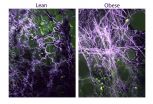(Press-News.org) DURHAM, N.C. -- You're driving on a busy road and you intend to switch lanes when you suddenly realize that there's a car in your blind spot. You have to put a stop to your lane change -- and quickly.
A new study by Duke University researchers suggests that this type of scenario makes a person less likely to remember what halted the action -- for example, the make and model of the car in the blind spot.
People and non-human primates excel at "response inhibition." Our sophisticated brains allow us to cancel an action even when it's something engrained, like driving on the right side of the road. Although it's not easy, we can override this inclination when we drive in foreign countries with left-hand traffic.
The new results, published Aug. 26 in the Journal of Neuroscience, lend insight into how the ability to inhibit an action -- a fundamental aspect of everyday life -- affects other important brain functions such as attention and memory. The findings may eventually inform the treatment of disorders characterized by difficulty inhibiting actions, such as attention deficit hyperactivity disorder (ADHD) and addiction.
Last year, for a study published in Psychological Science, Tobias Egner, an assistant professor of psychology and neuroscience at Duke, and postdoctoral researcher Yu-Chin Chiu decided to test how response inhibition affected memory.
In that study, participants completed a computer-based task in which they were asked to press a button if they saw a male face but withhold a response if they saw a female face. (Some subjects were asked to do the reverse.) They looked at a total of 120 different faces.
After five minutes of a filler task that had nothing to do with faces, the participants were then given a surprise memory test in which they viewed faces and were asked to indicate whether a face was new or familiar from the earlier task.
"We didn't really know which way that would go," said Egner, who is a member of the Duke Institute for Brain Sciences. "You could argue quite easily that canceling a response to a stimulus might actually make that stimulus more memorable."
However, they found the exact opposite: Memory was a little worse on the faces for which participants had to inhibit their responses.
In the latest study, Egner and Chiu saw the same results. But this time they wanted to understand why.
One potential reason people were forgetting the faces was that withholding a response was siphoning off their attention. Egner and Chiu tested this hypothesis by scanning the brains of participants, using functional magnetic resonance imaging (fMRI, a noninvasive, indirect measure of brain activity) as they completed the tasks.
These trials showed the particular faces that people later forgot were the same ones in which fMRI was showing that a known inhibition network in the brain had been strongly activated.
In addition, the brain areas that are known to be active when a person is committing something to memory -- including a region in the front of the brain called the ventrolateral prefrontal cortex -- were suppressed on those trials in which the participants had to inhibit their responses strongly. Not surprisingly, the subjects had poorer memory for those faces. "You don't encode those stimuli well when you have a high inhibitory demand," Egner said.
The new result supports Egner and Chiu's original idea of a see-saw relationship in the required brain demand that underlies response inhibition and memory. They think this can help explain variations in the participants' recall ability.
In addition, although such a connection is speculative, the findings may help support the observation that children with ADHD who are trying to override their inclination to fidget may not be able to focus as well. "Trying to inhibit these habitual actions might take a lot of resources, which takes away from paying attention," Egner said.
Response inhibition is only one of many forms of control the brain exerts in everyday life. Egner's group is now studying whether and how other modes of control -- such as rapidly switching tasks -- affect memory.
INFORMATION:
The research was supported by the National Institute of Mental Health (R01 MH 087610).
CITATIONS: "Inhibition-Induced Forgetting Results from Resource Competition between Response Inhibition and Memory Encoding Processes," Yu-Chin Chiu and Tobias Egner, Journal of Neuroscience, Aug. 26, 2015. DOI:10.1523/JNEUROSCI.0519-15.2015
"Inhibition-Induced Forgetting: When More Control Leads To Less Memory," Yu-Chin Chiu and Tobias Egner. Psychological Science, January 2015, DOI: 10.1177/0956797614553945.
ITHACA, N.Y. - After hours harvesting forage, managing livestock and milking cows, new Cornell University agricultural economic research shows family members who work on the family dairy farm make $22,000 less annually than comparable hired managers, but are handsomely compensated with "socioemotional" wealth.
"While $22,000 seems like a large penalty, there are nonfinancial rewards they experience working for the family business," said Loren Tauer, professor at Cornell's Charles H. Dyson School of Applied Economics and Management, who with lead author Jonathan Dressler ...
Compounds found in purple potatoes may help kill colon cancer stem cells and limit the spread of the cancer, according to a team of researchers.
Baked purple-fleshed potatoes suppressed the growth of colon cancer tumors in petri dishes and in mice by targeting the cancer's stem cells. Colon cancer is the second leading cause of cancer-related deaths in the U.S. and responsible for more than 50,000 deaths annually, according to the American Cancer Society.
Attacking stem cells is an effective way to counter cancer, according to Jairam K.P. Vanamala, associate professor ...
ITHACA, N.Y. - Women who are obese have a higher risk and a worse prognosis for breast cancer, but the reasons why remain unclear. A Cornell study published this month in Science Translational Medicine explains how obesity changes the consistency of breast tissue in ways that are similar to tumors, thereby promoting disease.
The study of mice and women shows obesity leads to a stiffening of a meshwork of material that surrounds fat cells in the breast, called the extracellular matrix, and these biomechanical changes create the right conditions for tumor growth.
The findings ...
A new study conducted by the Media Insight Project, a collaboration between the American Press Institute and The Associated Press-NORC Center for Public Affairs Research, found that while the similarities to the rest of their generation are numerous, there are some distinct differences in the way that Hispanic and African American Millennials use technology to access news and information. The source of their information is one area of difference: these young adults are more likely to use YouTube and Instagram for news than Millennials in general, though all groups rely ...
Howard Hughes Medical Institute (HHMI) scientists have discovered how the most common genetic defect in amyotrophic lateral sclerosis kills nerve cells. Their study suggests that the pores that allow molecules into and out of a cell's nucleus get jammed, a finding that could speed the search for other genes that promote this fatal illness.
In people who have amyotrophic lateral sclerosis (ALS), the motor neurons that operate the muscles deteriorate. Over time, the disease deprives patients of the ability to walk, swallow, and breathe, and they usually die within three ...
A study led by researchers from the U.S. Department of Energy's (DOE) SLAC National Accelerator Laboratory and the University of California, Los Angeles has demonstrated a new, efficient way to accelerate positrons, the antimatter opposites of electrons. The method may help boost the energy and shrink the size of future linear particle colliders - powerful accelerators that could be used to unravel the properties of nature's fundamental building blocks.
The scientists had previously shown that boosting the energy of charged particles by having them "surf" a wave of ionized ...
They're among the most powerful tools for shedding new light on cancer growth and evolution, but mathematical models of the disease for years have faced an either/or stand off.
Though models have been developed that capture the spatial aspects of tumors, those models typically don't study genetic changes. Non-spatial models, meanwhile, more accurately portray tumors' evolution, but not their three-dimensional structure.
A collaboration between Harvard, Edinburgh, and Johns Hopkins Universities including Martin Nowak, Director of the Program for Evolutionary Dynamics ...
New insight into methanotrophs, bacteria that can oxidise methane, may help us develop an array of biotechnological applications that exploit methane and protect our environment from this potent greenhouse gas.
Publishing in Nature, scientists led by Newcastle University have provided new understanding of how methanotrophs are able to use large quantities of copper for methane oxidation.
They have identified a new family of copper storage proteins called Csp that are present in a range of bacteria. These proteins store metal in a way that has not been seen previously ...
It's not a huge mystery why Los Angeles experiences earthquakes. The city sits near a boundary between two tectonic plates -- they shift, we shake. But what about places that aren't along tectonic plate boundaries?
For example, seismicity on the North American plate occurs as far afield as southern Missouri, where earthquakes between 1811 and 1812 estimated at around magnitude 7 caused the Mississippi River to flow backward for hours.
Until now, the cause of that seismicity has remained unclear.
While earthquakes along tectonic plate boundaries are caused by motion ...
The Pacific Northwest is abundantly dotted with wildfires in Washington, Oregon, Idaho and Montana. There are over 27 fires listed in the Inciweb database for the state of Washington. The largest active fire listed is the Okanogan Complex Fire which is currently at 256,567 acres and has 1,250 personnel working the fire. This fire began as a lightning strike on August 15, 2015. It is only 10% contained at present. Governor Inslee's request for a federal Emergency Declaration to provide additional resources to cover some of the costs related to multiple wildfires burning ...


